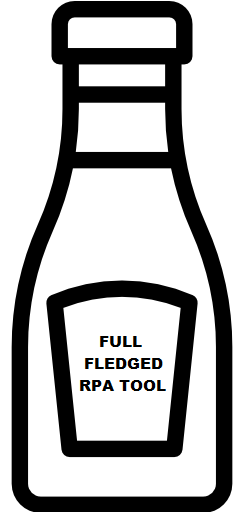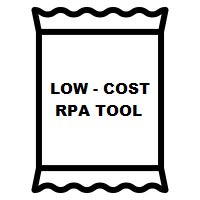RPA in a Sachet? Advent of Low-cost RPA

Imagine you’re at your favorite burger joint and instead of a handy sachet, you’re given a bulky ketchup bottle. Or all you wanted was a travel-size shampoo pack, but the store only has full-size bottles. Interestingly, the concept of the more handy and easy-to-purchase product is no longer limited to consumer products. A growing trend is of software products that are lightweight, can be implemented faster and easy to maintain, with the latest example being RPA or robotic process automation.

Dynamic and often volatile business environments result in disruptions in operations, making Intelligent Automation extremely important. While RPA has become a necessity for organizations of all kinds today with the potential to bring about digital transformation, it can typically be afforded only by large companies. However, a ‘one-size-fits-all’ approach instead of a bespoke RPA solution is both expensive and does not deliver desired goals.
The good news is that medium and small enterprises can today pick low-cost RPA tools instead of full-fledged conventional RPA tools which can seem intimidating and complex. Low-cost RPA tools are the perfect “sachets” that allow organizations to achieve desired outcomes without investing too much money and without requiring code re-writes or large scale system changes. Some of the leading low-cost RPA tools in the market such as Jiffy RPA, Workfusion, Intellibot AutomationEdge and WinAutomation have been successfully used by organizations in their automation journeys.
Why lightweight RPA tools are useful
Cost of ownership
Low cost automation tools are cheaper compared to full-fledged RPA tools, primarily due to their economical license fee structure. The total cost can be taken as the sum the below mentioned costs
- Initial Setup Cost for development and deployment for different processes. Processes first need to be identified and selected to undergo automation.
- Licence Fees for low-cost RPA tools are cheaper by 45-60% compared to conventional RPA tools. Cost of bot and server is much lower with some companies that even offer studio and orchestration capabilities at no cost, thereby making the overall fees highly competitive
- Maintenance Cost is slightly higher for low cost tools due to their limitations in community level support, readily available fixes and patches.
Learning curve
As no-code or low-code RPA tools require minimal coding, they have a gentle learning curve and a shorter development time for process automation. Organizations can use their existing process consultants to automate processes faster and without any need for standalone consultants.
Ease of deployment
Software setup is very easy compared to conventional RPA tools and all it requires is minimal coding backed by lean UI and a simplified installation process. Thus, making the overall deployment process much easier and faster.
What would you have to do without
Scalability
As process complexities and deployments increase in size, low-cost RPA tools lose their cost and deployment advantages. For organizations, vendor experience for similar size and industry becomes an important evaluation criterion. Not only this, the packaged bulk license fees for conventional RPA tools achieve “economies of scale” as the size of operation increases.
Cognitive maturity
As process are required to be scaled up, organizations seek Intelligent Automation solutions with cognitive capabilities (AI, NLP, OCR) to enhance their automation journeys. These cognitive capabilities increase the scope of automation which were previously limited to structured data and rule-based activities processes. Conventional RPA tools are at a greater advantage due their previous experience of operating at scale with large data volumes and bot deployments.
Vendor ecosystem and product support
When compared with low cost RPA tools, conventional RPA tools have a more mature and tested vendor ecosystem of implementation partners. Even the developers have richer experience in enabling hundreds of automation journeys. Conventional RPA tools offer much better community support, plug-and-play bots in app stores and regular product fixes/ patches which gives them a very strong foundation. Such an ecosystem also helps in addressing issues at a faster scale thus avoiding server/ bot downtime for important processes.
What’s certain is that lightweight RPA is here to stay, with its efficiency gains minus the need for mind boggling and hugely expensive revamps of existing systems. Such low-cost tools will become vital for enterprises with limited process automation capabilities, budget constraints, and requiring specific product functionalities or those that are just kickstarting their automation. Another edge they have is that low-code/ no-code lightweight solutions don’t need to wait to find highly skilled experts. Even members of a business unit will be able to configure RPA bots as per their automation needs. However, this approach is not a silver bullet, as there’s still the need to understand and map out existing processes that require automation.
More from Omar Siddiqui
Robotic Process Automation (RPA) is witnessing a paradigm shift in its narrative. From being…
Latest Blogs
Introduction What if training powerful AI models didn’t have to be slow, expensive, or data-hungry?…
Pharmaceutical marketing has evolved significantly with digital platforms, but strict regulations…
Leveraging the right cloud technology with appropriate strategies can lead to significant cost…
Introduction The financial industry drives the global economy, but its exposure to risks has…




